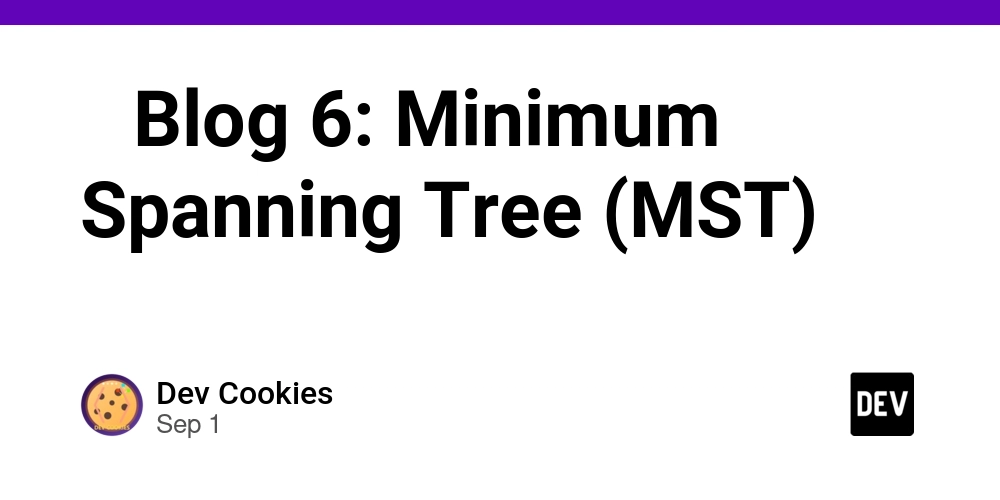📘 Blog 6: Minimum Spanning Tree (MST) 🌉
🔹 What is MST?
A Spanning Tree of a graph connects all vertices with the minimum number of edges (N-1 for N nodes), with no cycles.
A Minimum Spanning Tree (MST) is the spanning tree where the sum of edge weights is minimized.
✅ Graph must be:
- Connected
- Undirected
- Weighted
🔹 Why is MST Important?
- Network Design: Build road, cable, or data network with minimum cost.
- Clustering Algorithms (ML): Partitioning data.
- Approximation Algorithms: TSP, Steiner Tree.
🔹 MST Algorithms
We mainly use Kruskal’s and Prim’s.
1️⃣ Kruskal’s Algorithm (Union-Find / Greedy Approach)
Steps:
- Sort all edges by weight.
- Pick the smallest edge that doesn’t form a cycle.
- Use Union-Find (Disjoint Set Union – DSU) to check cycle.
- Repeat until you connect all vertices (N-1 edges).
Complexity:
- Sorting edges: O(E log E)
- Union-Find operations: ~O(E α(N)) (α(N) is inverse Ackermann, nearly constant).
👉 Best when graph is sparse (E ~ V).
Java Code (Kruskal’s MST):
import java.util.*;
class KruskalMST {
static class Edge {
int u, v, weight;
Edge(int u, int v, int weight) {
this.u = u;
this.v = v;
this.weight = weight;
}
}
static class DSU {
int[] parent, rank;
DSU(int n) {
parent = new int[n];
rank = new int[n];
for (int i = 0; i < n; i++) parent[i] = i;
}
int find(int x) {
if (parent[x] != x) parent[x] = find(parent[x]);
return parent[x];
}
boolean union(int x, int y) {
int px = find(x), py = find(y);
if (px == py) return false;
if (rank[px] < rank[py]) parent[px] = py;
else if (rank[px] > rank[py]) parent[py] = px;
else {
parent[py] = px;
rank[px]++;
}
return true;
}
}
public static int kruskalMST(int n, List<Edge> edges) {
Collections.sort(edges, Comparator.comparingInt(e -> e.weight));
DSU dsu = new DSU(n);
int mstCost = 0, count = 0;
for (Edge edge : edges) {
if (dsu.union(edge.u, edge.v)) {
mstCost += edge.weight;
count++;
if (count == n - 1) break;
}
}
return mstCost;
}
public static void main(String[] args) {
List<Edge> edges = Arrays.asList(
new Edge(0, 1, 10),
new Edge(0, 2, 6),
new Edge(0, 3, 5),
new Edge(1, 3, 15),
new Edge(2, 3, 4)
);
System.out.println("MST Cost = " + kruskalMST(4, edges));
}
}
✅ Output: MST Cost = 19
2️⃣ Prim’s Algorithm (Priority Queue / Greedy Approach)
Steps:
- Start from any node.
- Use a Min Heap to always pick the smallest edge connecting MST to a new node.
- Expand MST until all nodes are covered.
Complexity:
- With Min Heap (priority queue): O(E log V).
👉 Best when graph is dense (E ~ V²).
Java Code (Prim’s MST):
import java.util.*;
class PrimsMST {
static class Pair {
int node, weight;
Pair(int node, int weight) {
this.node = node;
this.weight = weight;
}
}
public static int primMST(int n, List<List<Pair>> graph) {
boolean[] visited = new boolean[n];
PriorityQueue<Pair> pq = new PriorityQueue<>(Comparator.comparingInt(p -> p.weight));
pq.offer(new Pair(0, 0)); // Start from node 0
int mstCost = 0;
while (!pq.isEmpty()) {
Pair cur = pq.poll();
if (visited[cur.node]) continue;
visited[cur.node] = true;
mstCost += cur.weight;
for (Pair nei : graph.get(cur.node)) {
if (!visited[nei.node]) pq.offer(nei);
}
}
return mstCost;
}
public static void main(String[] args) {
int n = 4;
List<List<Pair>> graph = new ArrayList<>();
for (int i = 0; i < n; i++) graph.add(new ArrayList<>());
graph.get(0).add(new Pair(1, 10));
graph.get(0).add(new Pair(2, 6));
graph.get(0).add(new Pair(3, 5));
graph.get(1).add(new Pair(3, 15));
graph.get(2).add(new Pair(3, 4));
System.out.println("MST Cost = " + primMST(n, graph));
}
}
✅ Output: MST Cost = 19
🔹 Kruskal vs Prim – When to Use?
| Algorithm | Best for | Time Complexity | Data Structures |
|---|---|---|---|
| Kruskal’s | Sparse Graphs (few edges) | O(E log E) | Sorting + Union-Find |
| Prim’s | Dense Graphs (many edges) | O(E log V) | Min Heap + Adjacency List |
🔹 Common MST Problems
🔹 Interview Takeaways
- MST = Greedy choice (pick min edge).
- Kruskal → edges sorted + DSU.
- Prim → priority queue on vertices.
- Both produce same MST cost.

